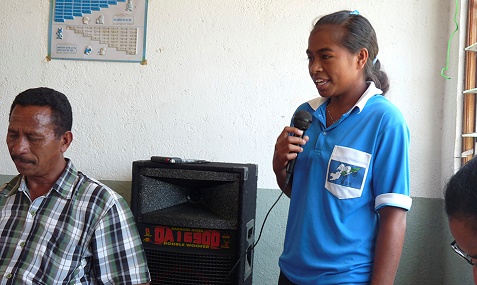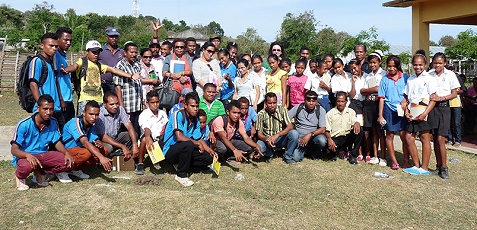Timor-Leste’s women parliamentarians engage with rural women on issues of peace and security, past and present
Date:
“Women are both mothers and angels for peace. They have a vital role to play in all sectors of state development, including participating in the negotiations for peace and stability,” declared Ms. Albina Frietas, Vice President of the Grupo das Mulheres Parlamentares de Timor-Leste (GMPTL or Women’s Parliamentary Caucus) at the opening of a day-long dialogue between the community of Hato-Hudo sub-district, Ainaro district and five women members of parliament. The topic of the day was women’s role in peace building and conflict transformation as established in the UN Security Council Resolution 1325 on Women, Peace and Security. This resolution highlights the vulnerability of women during conflict and the importance of women’s participation in peace negotiations and peace building following conflict.

Josefina Sarmento Alves Amelia Magno takes the microphone to ask MPs about the safety of young women with escalating incidences of violence in the capital Dili. Photo credit: UN Women/Aisling Walsh
Women now make up 38% of all MPs in Timor-Leste; the highest proportion of female representation at parliamentary level in the Asia-Pacific region. The 25 women MPs are represented by the GMPTL, which supports the parliamentarians in their engagement with their constituents, their work in parliament and building their expertise around important issues of development and women’s rights in Timor-Leste.
The dialogue was hosted by the representatives of local authorities - Joaninho da Costa Araujo, Acting Hato-Hudo village chief, Sub-district Administrator and Francisco Barros, Deputy Ainaro District Administrator and attended by the representatives of sub-district and village police, school administrator, women and men from the village. Ms. Freitas highlighted the vital role that women played in Timor-Leste’s history when Timorese women were involved in the resistance as combatants and later as negotiators for peace. However, now that government priorities have shifted from maintaining peace and stability to promoting social and economic development, it is important that women are given the space to participate actively in shaping Timor-Leste’s future and that their needs are addressed in all development projects.
The participants mainly focused on justice for victims of violence and shared views on the key factors impacting community insecurity such as domestic violence, women’s marginalization and exclusion from community affairs, low number of women in the police force (2 out of 12) and martial arts activities. The issue of women’s representation and participation in decision making over national and local level issues and processes was raised and discussed throughout the whole dialogue. Many of the men present at the discussion recognized women’s participation is important both in the family and in development. They stated that they will support women in their community to participate actively in community meetings and public life.

Participants at dialogue with MPs in Hatu Hudo, Ainaro District. Photo credit: UN Women/Aisling Walsh
Some of the younger women present also raised concerns about more current issues of harassment and violence against women, especially of women who travel from rural areas to the capital, Dili. Josefina Sarmento Alves Amelia Magno, an 18 year old student who is about to begin studying medicine in Dili, voiced her concerns about recent violence between martial arts gangs in Dili as well as the general fear of violence and sexual harassment that she might face as a young woman. Josefina said that she was “inspired to see ordinary Timorese women serving as members of parliament” and that “it is important for women to participate so that there is a wide variety of opinions in government.”
The parliamentarians will continue to visit communities throughout this year and the next to create dialogue around issues such as the Law Against Domestic Violence, women’s access to land and women’s participation in local and national political life.